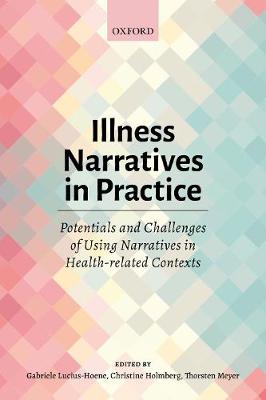(To see other currencies, click on price)
MORE ABOUT THIS BOOK
Main description:
What is it like to live with an illness? How do diagnostic procedures, treatments, and other encounters with medical institutions affect a patient's private and social life? By asking these types of questions, illness narratives have gained a reputation as a scientific domain in medicine in the last thirty years. Today, a patient's story plays an important role in doctor-patient communication and the development of a healing relationship.
However, whereas patient experiences have been well acknowledged, methodologically reflected upon and widely collected as research data, less consideration has been invested in exploring how they work in practice. Used in the context of diagnosis, treatment, and teaching, patient stories give us a new perspective on how healthcare could be improved.
Illness Narratives in Practice: Potentials and Challenges of Using Narratives in Health-related Contexts highlights the problems, challenges, and opportunities we face when using patient perspectives in practice and research in a clear format to provide readers with a comprehensive overview of this field. It investigates the epistemological foundations and communicational properties of illness narratives, as well as the pragmatic effects of using them as clinical and educational instruments.
Significantly, it presents new examples from patient intakes and interviews that illustrate the disparity in communication between patients and medical professionals. The studies in this book also evaluate the experiences of medical practitioners and students who consciously use patient narratives as a
tool for improved communication and diagnosis.
Divided into eight sections with practical examples for medical teaching and practice, this book covers the use of patient narratives in communication training and decision making across medicine and psychotherapy. In addition, it reflects on the ethical aspects of working with a patient's personal experience of their illness, reports on cultural differences across the globe, and analyses how patients' stories are used in politics and the media. Written by scholars from multiple disciplines
across clinical and theoretical fields, this rich resource provides a critical stance on the use of narratives in medical research, education, and practice.
Contents:
Section 1: Introduction
1: Gabriele Lucius-Hoene, Christine Holmberg and Thorsten Meyer: Introduction: Chances and problems of illness narratives
Section 2: Methodological and epistemological challenges
2: Gabriele Lucius-Hoene, Martina Breuning and Cornelia Helfferich: Illness narratives in practice: which questions do we have to face when collecting and using them?
3: Janka Koschack and Wolfgang Himmel: The researchers' role in re-constructing patient narratives to present them as patient experiences
4: Lars-Christer Hyden: Stories, illness and narrative norms
5: Thorsten Meyer and Margret Xylander: Choices of illness narratives in practice: applying ideas of sampling and generalizability
Section 3: Ethical and communicational aspects of using narratives in medicine
6: Hille Haker: Illness Narratives in Counselling - Narrative Medicine and Narrative Ethics
7: Maya Lavie-Ajayi and Ora Nakash: An Illness Narrative or a Social Injustice Narrative?
Section 4: Narratives in psychotherapy, rehabilitation and vocational training
8: Sabine Corsten and Friedericke Hardering: Retelling one's life story - Using narratives to improve quality of life in case of chronic language impairment
9: Peter Frommelt, Maria I. Medved, and Jens Brockmeier: Narrative practice, Neurotrauma, and Rehabilitation
10: Ernst von Kardoff: Illness narratives in the workplace
Section 5: Narratives in training of communication and empathy
11: Alexander Kiss and Claudia Steiner: Using narratives for Medical Humanities in medical training
12: Yon Ok Jung, Gabriele Lucius-Hoene and Yong Ik Bak: Narratives for training doctors in Korea
13: Alexander Palant and Wolfgang Himmel: How to use illness narratives in medical education: First teaching experiences with the German DIPEx website project
14: Paula McDonald: Using patient narratives as source material for creative writing
15: Chris Heape, Henry Larsen, and Merja Ryoeppy: Engaging the Vulnerable Encounter: engendering narratives for change in healthcare practice by using participatory theatre methods
16: Joyce Lamerichs and Manna Alma: Drawing on narrative accounts of dementia in education and care
Section 6: Narratives in diagnostics
17: Elisabeth Gulich: Using illness narratives in clinical diagnosis: narrative reconstruction of epileptic and non-epileptic seizures and panic attacks
18: Christian Roesler: Structural Dream Analysis: a narrative methodology for investigating the meaning of dream series and their development in the course of psychotherapy
Section 7: Narratives in decision making
19: Christine Holmberg: What's in a name: anecdotes, experience, and the meaning of stories
20: Victoria A. Shaffer and Brian J. Zikmund-Fisher: Narratives in decision aids: A controversy
Section 8: Narratives in health care
21: Lisa Hinton, Louise Locock and Sue Ziebland: Understanding and using health experiences to improve healthcare - examples from the United Kingdom
22: Susan Law, Ilja Ormel, David Loutfi and John Lavis: Illness narratives as evidence for healthcare policy
23: Rachel Grob and Mark Schlesinger: When Public and Private Narratives Diverge: Media, Policy Advocacy, and the Paradoxes of Newborn Screening Policy
Section 9: Illness narratives in the media
24: Eleonora Massa and Valentina Simeoni: Pregnancy 2.0: A Corpus-based Case Study for the Analysis of Illness Narratives Online
25: Erez C. Miller and Amos Fleischman: Changes in Authenticity: Perceptions of Parents and Youth with ADHD of the Effects of Stimulant Medication
26: Matthias Bandtel: Illness narratives in political communication: instrumental, institutional, and social functions of political actors' public illness accounts
PRODUCT DETAILS
Publisher: Oxford University Press
Publication date: October, 2018
Pages: 384
Dimensions: 171.00 x 247.00 x 21.00
Weight: 666g
Availability: Available
Subcategories: Ethics, General Practice, Public Health

